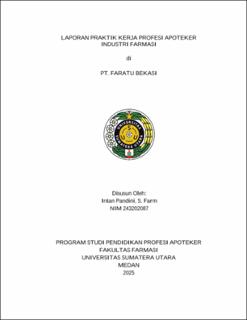| dc.description.abstract | Background: The pharmaceutical industry is a business entity that has a license in
accordance with the provisions of the law to carry out activities related to the
manufacture of drugs or drug ingredients. Drug manufacturing is the entire stage of
activities in producing drugs, which includes the procurement of raw materials and
packaging materials, production, packaging, quality control, and quality assurance
until the drugs are ready for distribution. Drug manufacturing encompasses all stages
of drug production, including procurement of raw materials and packaging materials,
production, packaging, quality control, and quality assurance until the drugs are ready
for distribution.
Objectives: The PKPA held at PT. Faratu Pharmaceutical Industry aims to improve
prospective pharmacists' understanding of the role, function, position, and
responsibilities of pharmacists in the pharmaceutical industry; equip prospective
pharmacists with the insight, knowledge, skills, and practical experience to perform
pharmaceutical work in the pharmaceutical industry; and provide prospective
pharmacists with the opportunity to learn the principles of CPOB and their
application in the pharmaceutical industry.
Method: The PKPA was conducted from April 8 - May 30, 2025 at PT. Faratu,
located at Jl. Raya Narogong, RT.001/RW.006, Cikiwul, Kec. Bantar Gebang, Bekasi
City, West Java, for 5 days a week with 8 working hours from 08.00 - 17.00 WIB.
Results: Pharmaceutical activities at PT. Faratu comply with and implement
government regulations, namely Food and Drug Supervisory Agency Regulation No.
7 of 2024 concerning Good Manufacturing Practices (GMP). GMP aims to ensure
that drugs are produced consistently, meet established standards, and are suitable for
their intended use. The implementation of GMP in the pharmaceutical industry is
evidenced by the possession of a GMP certificate issued by the Food and Drug
Supervisory Agency (BPOM). The GMP guidelines cover various aspects that affect
drug quality during the production process
Conclusion: PKPA at PT. Faratu equips prospective pharmacists with critical
insights, skills, creativity, and practical experience in thinking that builds knowledge
through pharmaceutical work in the industry through PKPA induction, as well as
explanations from mentors and the assignment of special tasks and direct
opportunities to learn the principles of Good Manufacturing Practices (GMP), both in
terms of theory (SOP) and its application in the pharmaceutical industry. | en_US |


